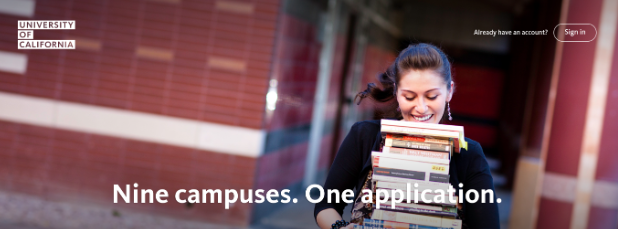Is the UC Admissions System Better?
September 21, 2022
Across the United States, high school seniors are scrambling to write essays, perfect test scores, collect recommendations, and fill out forms, all to achieve one goal: admission to their college of choice. For many students, the demands of college applications are spiking their stress levels to an unprecedented level. Yet, at the University of California’s nine campuses, college admissions are just as chill as a stereotypical surfer on Venice Beach.
To start, the University of California (UC) admissions website displays in bold, “Nine Campuses. One Application.” While popular platforms like the Common Application do organize information for college-bound students, most colleges who accept the Common App require many supplementary questions and essays on top of the general application. Students do specify the colleges they’re interested in on the UC application, but beyond that, everything from the student information to the personal questions is all on the same form.
But, perhaps what is most remarkable about the UC application is its lack of traditional requirements. On the Common App, students provide a full personal essay, teacher recommendations, and many colleges still require test scores (like the SAT or ACT). In 2021, the University of California Board of Regents voted unanimously to do away with SAT and ACT testing requirements for admissions, claiming that standardized testing can allow white, wealthier students to perform disproportionately better than their low-income peers and peers of color. Additionally, the UC application requires no additional information or recommendations from teachers or schools, and only asks students to answer a few short personal questions.
For many students, this laid-back approach to college admissions feels less stressful and performative than it does at other schools. Fruita alumni Tessa Reimer, who began attending UC Berkeley this fall, said, “I liked how the UC application looked at who you are as a person, not as statistics or numbers on a page.”
The significant changes the University of California made don’t just reduce stress, they also raise a crucial question: what do fair college admissions look like? The UC has given itself until 2025 to develop a standardized test unique to California that can provide an evaluative measure without reinforcing systemic racism and classism. Is it even possible to develop an evaluative measure that doesn’t favor those who are able to devote the time, money, and energy to perform well?
As Reimer says, “While I do think UC Admissions are more fair than other colleges, there are still problems. Some students get application fees waived, but even for those who don’t, it can be expensive to pay for every UC you apply to. And I do think that the more holistic view can end up being more subjective.”
Colleges may do well to look at California as an example of what applying for college looks like in the modern world. Still, it is going to take the voices of many more students, teachers, parents, and college officials across the country to make an imperfect system work for all.

